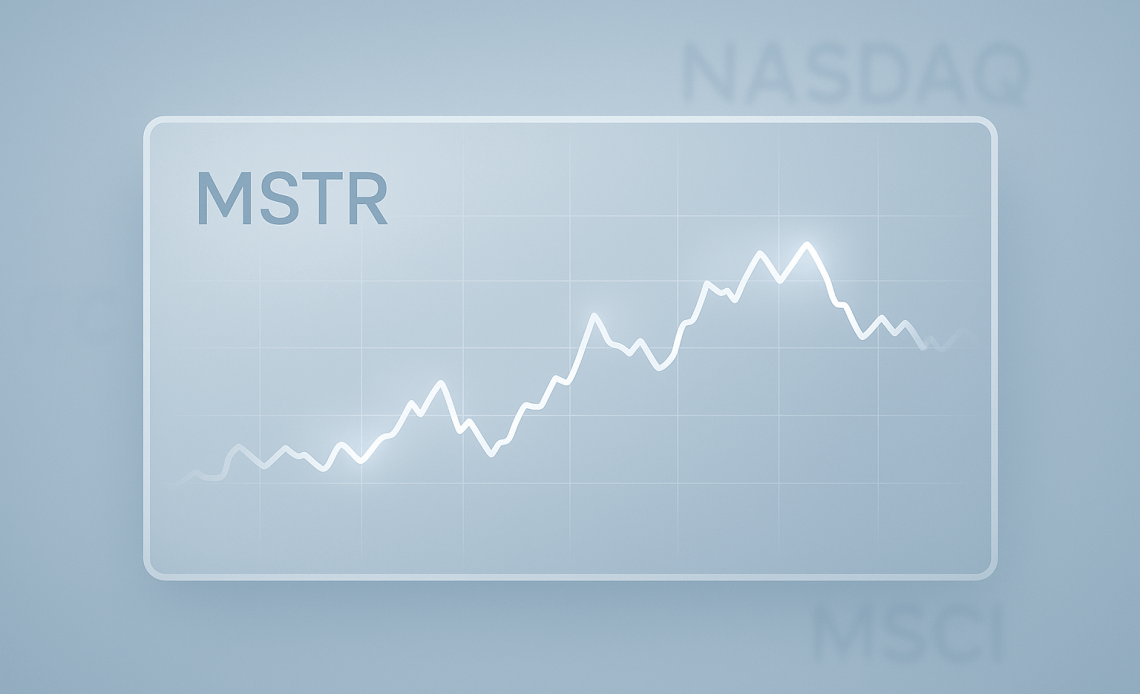JPMorgan strategists issued a stark warning this week: MicroStrategy risks exclusion from major equity indexes, potentially triggering a cascade of forced selling that could drain nearly $9 billion in passive fund holdings.
The culprit isn’t business weakness; it’s the company’s extraordinary Bitcoin holdings, which now dominate its balance sheet and have prompted global index providers to reassess whether it belongs in mainstream stock benchmarks.
What JPMorgan says and the immediate market fallout
The investment bank’s recent analysis zeroes in on a looming pivot: MSCI, the world’s most influential index provider, is evaluating whether to exclude companies whose digital-asset holdings exceed 50% of total assets.
MicroStrategy sits firmly in that crosshairs, with Bitcoin comprising roughly 99% of its enterprise value after the company pivoted from software to crypto treasury under founder Michael Saylor five years ago.
JPMorgan estimates MSCI removal alone could unleash $2.8 billion in forced outflows from passive funds.
If other index families follow, a realistic scenario, the total bleeding could reach $8.8 billion.
That’s nearly 15% of the company’s current market cap, delivered as a mechanical sell-off with no room for negotiation.
The stock itself is already under siege. MicroStrategy has plummeted 60% from its July peak and now trades around $177, having fallen faster than Bitcoin itself, a signal that index-exclusion fears, not crypto weakness, are driving the sell-off.
JPMorgan’s strategist Nikolaos Panigirtzoglou noted that roughly $9 billion of Strategy’s $59 billion market cap sits in passive index funds tracking the Nasdaq 100, MSCI USA, and MSCI World. That’s the dry tinder waiting for a spark.
Investor implications and what to watch next
Index exclusion matters because it triggers mechanical selling, not discretionary trading.
When a stock gets dropped from an index, passive funds tracking that benchmark are forced to sell shares to match their updated weightings.
There’s no waiting for a better price; it’s algorithmic, relentless, and can push valuations sharply lower.
For MicroStrategy shareholders, the stakes extend beyond a one-day dump.
Losing index status would damage the company’s reputation and credit profile, raising borrowing costs and complicating future capital raises.
Lower trading volumes would thin liquidity, making the stock less attractive to institutions.
Most critically, MicroStrategy’s valuation ratio to its Bitcoin holdings would converge toward one, meaning Wall Street would treat it increasingly as a cryptocurrency custodial fund rather than an operating company with strategic value.
Investors watching this situation should monitor three things: MSCI’s January 15, 2026 decision date (framed as “pivotal” by analysts); passive fund rebalancing notices that signal forced selling.
Lastly, Bitcoin’s price correlation with MicroStrategy has already begun to diverge sharply as exclusion risk dominates sentiment.
The bottom line: Index removal would be a structural reset, not a cyclical stumble. Weigh that index-flow risk carefully alongside your Bitcoin exposure thesis and conviction in Saylor’s long-term strategy.
The post JPMorgan flags MSTR delisting risk: what it means for investors appeared first on Invezz







